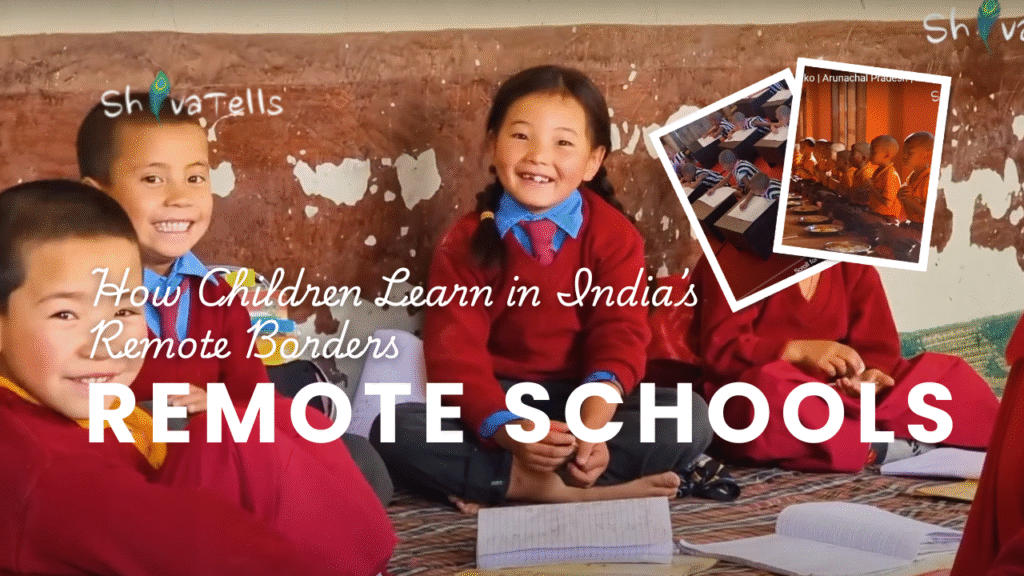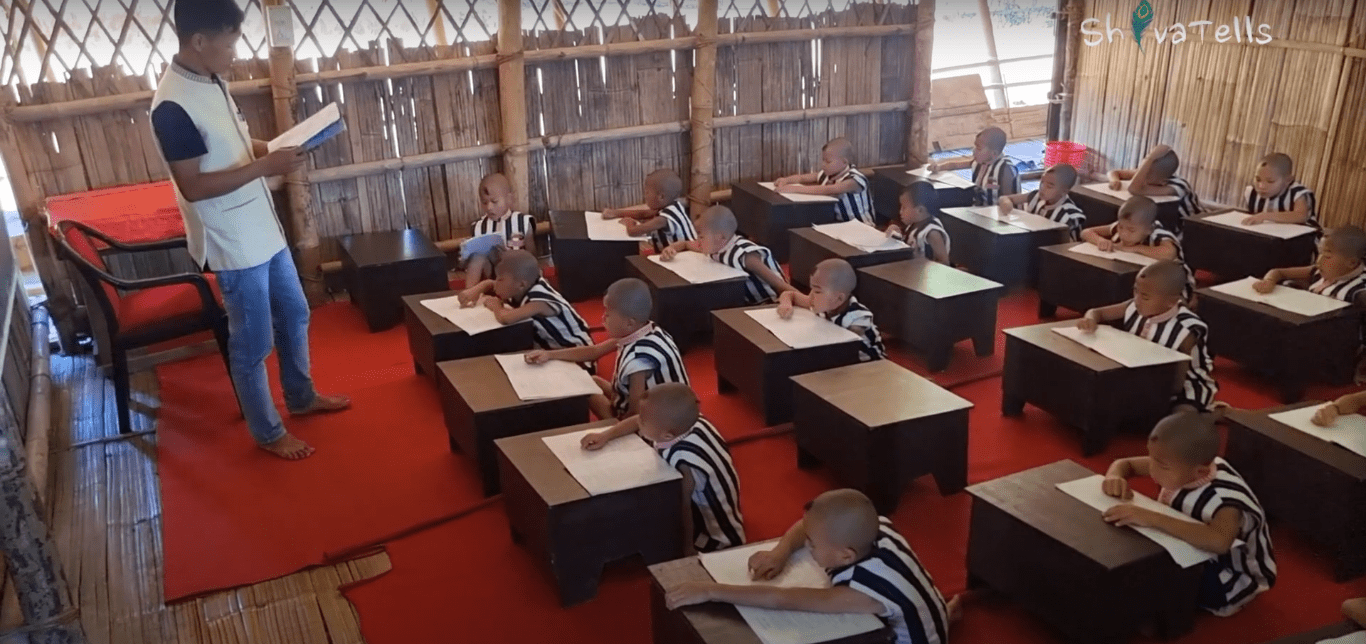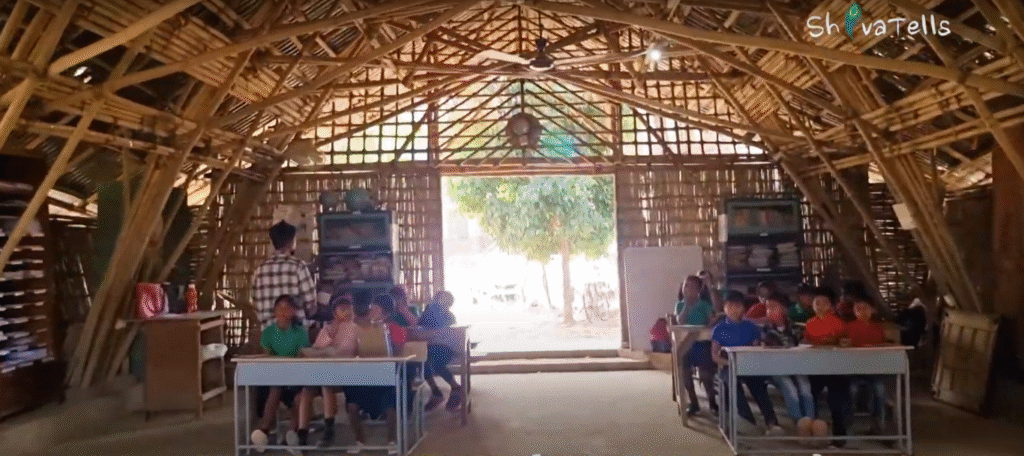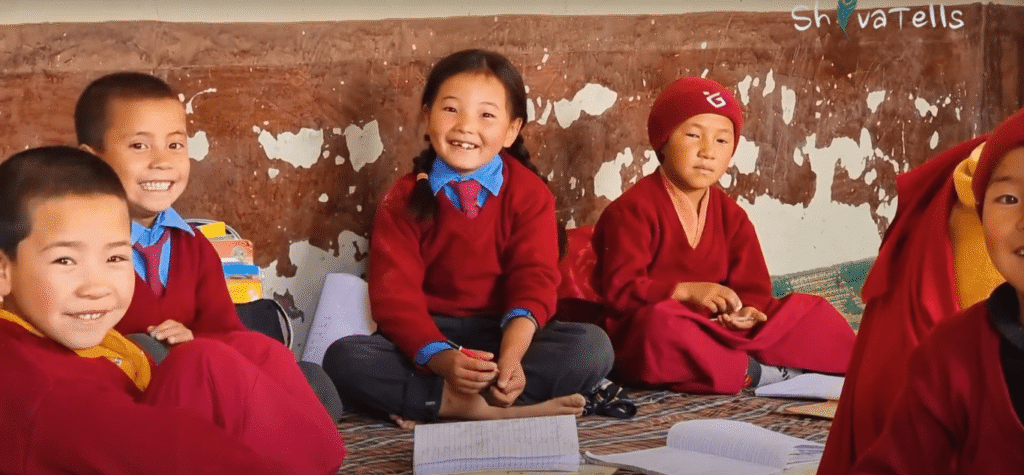India’s remote valleys and border villages often remain far from the reach of modern educational institutions. But despite the distance, many tribal communities are finding innovative ways to ensure their children receive an education that blends tradition with modernity. From the pristine hills of Arunachal Pradesh to the distant reaches of Ladakh, these schools are shaping young minds, preserving culture, and empowering the future generation. Here’s a peek into the unique educational experiences I encountered during my travels.

Table of Contents
The Gurukul of the Nishi Tribe: A Fusion of Tradition and Learning
In the heart of Arunachal Pradesh, tucked in the picturesque Run Village, I discovered a fascinating model of education—the tribal gurukul of the Nishi tribe. This school, perched high above the town and overlooking a serene river, is unlike anything you’d expect. It’s a blend of indigenous wisdom and modern schooling that aims to keep the Nishi traditions alive while providing a broad educational base.
How to Reach Run Village:

Run Village is located in East Kameng District, Arunachal Pradesh. To reach this remote village, you can take a flight to Tezpur or Guwahati and then travel by road to East Kameng District. The nearest town is Seppa, and from there, you can hire a local vehicle to take you to Run Village. It’s an adventurous journey, so be prepared for a long but rewarding trip through scenic mountain roads.
At this unique gurukul, children are not just taught the basics of reading and writing, but also how to chant traditional prayers, learn local languages, and practice age-old skills like archery, which was once essential for survival. They also learn mathematics, Hindi, and even yoga. What’s remarkable here is the importance placed on preserving culture alongside formal education. Through these teachings, the children aren’t just preparing for the future; they’re learning to protect and celebrate their heritage.
This free school has a strict admission process involving a written test and an interview with the parents, ensuring that only the most dedicated students make the cut. The sense of community service and discipline among the children left me in awe. It was clear that these students weren’t just learning academics; they were being groomed to lead with integrity and respect for their environment.
The best part? The children are also taught the importance of wildlife conservation, blending their traditional skills with modern values. It was truly heartwarming to see how the community is coming together to nurture their children while safeguarding their customs and values.
Akshar Forum School: Education Through Sustainability
Not too far from the hustle and bustle of Guwahati, in Pamohi village, I came across a school that’s taking an entirely different approach to learning. The Akshar Forum Model School isn’t just about textbooks—it’s about creating future leaders while teaching sustainability and responsibility. The school operates on a fascinating model: instead of paying fees, students bring in used plastic bottles. The idea here is simple yet powerful—teaching children the value of recycling while also providing them with an education.
How to Reach Pamohi Village:

Pamohi village is about a 45-minute drive from the center of Guwahati. You can hire a taxi or use public transport from Guwahati to reach Pamohi. The journey offers a glimpse into rural Assam and will take you through beautiful landscapes, making the experience even more memorable. The school is easily accessible once you’re in the village.
What I found even more impressive was the school’s innovative way of ensuring that students remain engaged and motivated. Akshar isn’t just a place to read and write. It’s a hub for creativity and hands-on learning, where students work on projects like farming, carpentry, and even medical training for street animals. These children aren’t just getting a standard education—they’re learning how to think critically, solve real-world problems, and even earn while they learn.
The school’s “Learning More, Earning More” program also helps senior students earn mock currency by teaching younger children. This currency can be used in the school shop or redeemed for small rewards, teaching them valuable lessons about money, trade, and exchange. The hands-on experience is preparing them for a world beyond the classroom while reinforcing their academic lessons.
The true beauty of this initiative lies in how it involves the entire community. The local villagers helped build the bamboo structures for the school, generating income for families while providing a learning space for the children. Akshar is a prime example of how education can be a community-driven effort that addresses both learning and livelihood.
A Buddhist Retreat in Ladakh: Where Spirituality Meets Education
During my travels to Ladakh, I stumbled upon another fascinating educational model. At a Buddhist nunnery in the remote village of Dargyaling, young girls are not just learning the Buddhist practices but also getting a well-rounded education. They are taught subjects ranging from science and mathematics to the intricacies of Buddhist philosophy. The nuns, who are from various regions, choose to stay and study here, where they practice their spiritual beliefs while also gaining an education that prepares them for the world outside.
How to Reach Dargyaling Village, Ladakh:

Dargyaling village is located in the Leh region of Ladakh. To reach the village, you can take a flight to Leh from Delhi, which is the nearest major airport. From Leh, you can either take a taxi or a shared jeep to Dargyaling, which is a remote area nestled within the region. The journey offers breathtaking views of the majestic mountains and the spiritual atmosphere of Ladakh.
The beauty of this school lies in its balance. The children here aren’t just taught from books—they learn how to meditate, perform prayers, and immerse themselves in their culture while simultaneously acquiring academic knowledge. The girls are given the option to continue their education and pursue higher studies or stay on and become nuns, helping to preserve the centuries-old practices of Buddhism.
As I sat there in the tranquil setting, I couldn’t help but be struck by how the girls were not just learning the art of meditation but also acquiring practical knowledge that would empower them to make a difference in their communities.
Challenges and Triumphs: The Struggles of Border Education
While these schools are certainly inspiring, they also face unique challenges. Infrastructure, lack of resources, and access to technology are often barriers in remote areas. But what these schools have managed to do is truly remarkable—they’ve created an environment where learning isn’t confined to a classroom but integrated into everyday life. The resilience of these communities is an inspiration, and it shows that even in the most isolated places, the thirst for knowledge is alive and kicking.
In my time spent with these children and teachers, I realized that education in these remote valleys is not just about learning facts. It’s about instilling values, preserving culture, and preparing the next generation to face a rapidly changing world while staying rooted in their traditions. These schools might be far from the cities, but they are shaping tomorrow’s leaders, one lesson at a time.
Conclusion: Preserving Heritage While Shaping the Future
These stories from the remote valleys of India have taught me a lot about resilience and innovation. The way these schools are functioning, blending education with culture, sustainability, and community involvement, is a powerful example of how much can be achieved even in the most challenging circumstances. They show that learning isn’t just about textbooks—it’s about understanding the world around us, embracing our heritage, and preparing for a future where we respect both nature and knowledge.
As I continue my travels, I hope to share more of these incredible stories with you, so you too can see how education is evolving in the hidden corners of India. For more such stories and insights into life in India’s most remote regions, follow my journey on ShivaTells.
Watch Tribe stories
- WIND festival of TUTSA Tribe | Tutnu Village | Pongtu Festival
- Are you WORTHY to wear this HELMET?? | Nyishi Tibe | Arunachal Pradesh |
